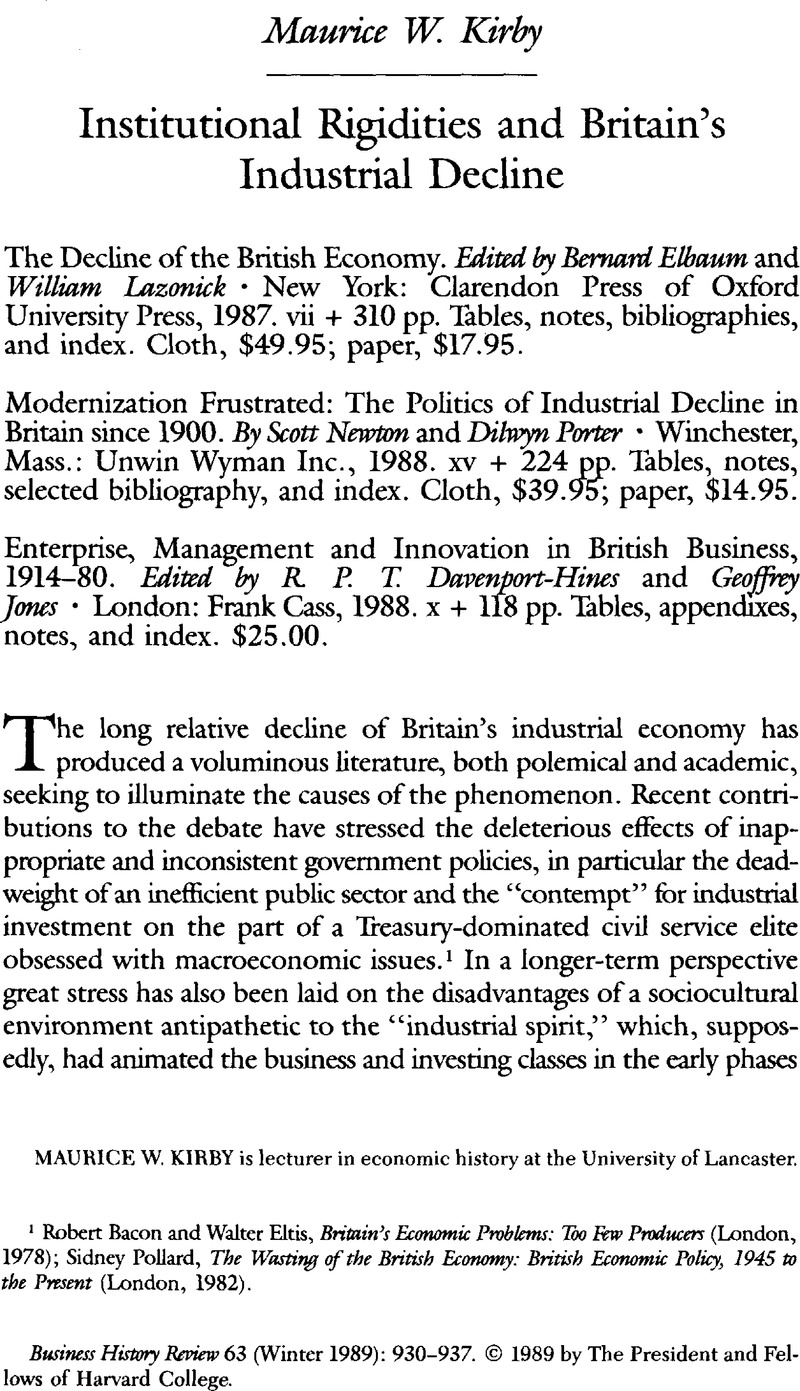Article contents
Institutional Rigidities and Britain's Industrial Decline - The Decline of the British Economy. Edited by Bernard Elbaum and William Lazonick · New York: Clarendon Press of Oxford University Press, 1987. vii + 310 pp. Tables, notes, bibliographies, and index. Cloth, $49.95; paper, $17.95. - Modernization Frustrated: The Politics of Industrial Decline in Britain since 1900. By Scott Newton and Dilwyn Porter · Winchester, Mass.: Unwin Wyman Inc., 1988. xv + 224 pp. Tables, notes, selected bibliography, and index. Cloth, $39.95; paper, $14.95. - Enterprise, Management and Innovation in British Business, 1914–80. Edited by R. P. T. Davenport-Hines and Geoffrey Jones · London: Frank Cass, 1988. x + 118 pp. Tables, appendixes, notes, and index. $25.00.
Published online by Cambridge University Press: 13 December 2011
Abstract

- Type
- Review Essay
- Information
- Copyright
- Copyright © The President and Fellows of Harvard College 1989
References
1 Bacon, Robert and Eltis, Walter, Britain's Economic Problems: Too Few Producers (London, 1978)CrossRefGoogle Scholar; Pollard, Sidney, The Wasting of the British Economy: British Economic Policy, 1945 to the Present (London, 1982).Google Scholar
2 Wiener, Martin J., English Culture and the Declini of the Industrial Spirit, 1850–1980 (New York, 1981).Google Scholar
3 See Chandler, Alfred D. Jr, The Visible Hand: The Managerial Revolution in American Business (Cambridge, Mass., 1977).Google Scholar
4 For a fuller exposition of Tolliday's views see Tolliday, Steven, Business, Banking and Politics: The Case of British Steel, 1918–1939 (Cambridge, Mass., 1987).Google Scholar
5 Lewchuk's analysis is treated more fully in Lewchuk, Wayne, American Technology and the British Vehicle Industry (New York, 1987).Google Scholar
6 Gerschenkron, Alexander, “Some Further Notes on ‘Social Attitudes, Entrepreneurship, and Economic Development,’” Explorations in Entrepreneurial History 6 (1953–1954): 118.Google Scholar
7 D. C. Coleman in Business History 30 (1988): 131.
8 See Pollard, Sidney, ed., The Gold Standard and Employment Policies between the Wars (London, 1970)Google Scholar; Ingham, Geoffrey, Capitalism Divided? The City and Industry in British Social Development (London, 1984).CrossRefGoogle Scholar
9 Cottrell, P. L., Industrial Finance, 1830–1914: The Finance and Organisation of English Manufacturing Industry (London, 1980).Google Scholar
10 Coleman, Donald, “The Uses and Abuses of Business History,” Business History 29 (1987): 149.CrossRefGoogle Scholar
11 The sectors covered include shipbuilding, iron and steel, glassmaking, chemicals, textiles, coal, tobacco, hardware, paper manufacture, and railways.
12 Hannah, Leslie, The Rise of the Corporate Economy (London, 1983).Google Scholar
- 1
- Cited by


